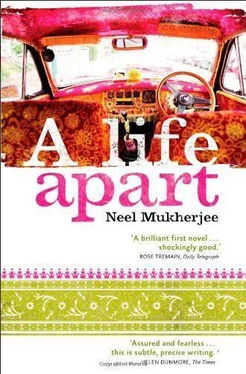It was mayhem from that point. Miss Gilby and Miss Shepherd properly looked away and fixed their gazes on the Indian contingent, pretending that this was an everyday occurrence that did not merit even the briefest of pauses in the conversation. Miss Gilby continued with the introductions but didn’t progress beyond two or three more words because the Indian women had broken into uncontrollable laughter, accompanied by hoots and shrieks. A young girl stood up and ran out, laughing hysterically, the thin music of her jangling chains and bangles chasing after her. Another girl stood up and tried to make loud noises of disgust, shaking her hands as though she was trying to rid them of excess water, but was overwhelmed by mirth and subsided helplessly into the arms of another hysterical woman. Over this cacophony of raucous and uninhibited laughter, the Maharani was trying to summon a seriousness, which was clearly eluding her. Her face was oddly poised between laughter at one moment, disapproving frowns the next. The interpreter had meanwhile moved into everyone’s field of vision and was bowing to Her Highness, clearly awaiting instructions from her.
Jane had been stunned into silence but Iris kept repeating her question ‘Was that a peacock? Was that a peacock?’ over and over again but no one bothered to give her an answer. Miss Gilby suddenly noticed that the tittering and the whispering in the Indian camp hadn’t stopped. In between unbridled laughter, the gossipy conversations continued; all the women were now staring, whispering and laughing with such concerted yet easeful candour that Miss Gilby was in no doubt they were laughing at their visitors, so differently attired, so different looking they could be other creatures altogether.
The Maharani at last managed to bark out a rapid string of imperious words. The interpreter bowed low and departed from the room. A woman, presumably an ayah , walked in with a boy of about seven or eight, dressed in impeccable white silk and a gold-bordered, feathered pink turban. He halted in his tracks when he saw the foreigners and turned around to hide his face in the voluminous folds of his ayah ’s clothes. A wave of commotion arose from the Indian women at the sight of this little boy, so reluctant to advance to the centre of the room. There were calls, shouts, cheers and in Miss Gilby’s utter inability to understand a single word or read a single exclamation, they could equally well have been cheering the boy on, voicing blandishments, issuing orders or coaxing him.
The interpreter returned with two servant girls who set about cleaning up the mess the peacock had made. He bowed in the direction of the boy, to the gaggle of queens and princesses and disappeared into the shadows again. One of the women said something loudly. After a few seconds’ pause the interpreter said, ‘Are the honourable English ladies giving birth to any children? Are they having husbands?’
It took a considerable while for the questions and their possible meanings to sink in. During that interim, the Indian women didn’t take their eagerly anticipating eyes off their guests. Miss Gilby frowned, she hoped disapprovingly. Jane Fearfield started giggling again, while Miss Shepherd opened and shut her mouth, at regular intervals, like a landed fish.
Miss Gilby cleared her throat and answered, ‘If I understand you correctly, only Jane Fearfield here is married. I am the sister of James Gilby, the District Collector of Madras, and Miss Iris Shepherd has just arrived from England.’
The interpreter passed this through the opaque glass of his Indian language; Miss Gilby was certain the reflection was a very distorted version of reality. Another voice, another set of orders, silence from the interpreter, then the slow, gently goading movements of the ayah trying to move her charge to the centre of the room. The boy stood with his back to the Indian contingent, facing the English visitors. Someone from the Indian side spoke out — she could have been his mother — and the boy was repositioned to turn ninety degrees, with one group to his left, another to his right and the shadows at the far end of the room in front of him.
The interpreter announced, ‘His Highness Prince Krishna Wadiar will now sing an English song in honour of the English guests.’
Another round of whispering and tittering broke out in the Indian camp. It didn’t seem to be doing the prince, clearly very nervous and inhibited, any good. The English ladies, their curiosity piqued by the surprise announcement, leaned forward. What song was it going to be? How come the little prince spoke English? Who tutored him in the language? Why wasn’t that tutor acting as interpreter today?
A thin, high voice started up, so weak in the cavernous spaces of the room, it could barely be heard. An Indian woman shouted out one word repeatedly. The boy stopped and started again but there was no appreciable difference to the volume. Miss Gilby strained to hear the words of the song to identify it — the tune was practically non-existent — but couldn’t make out even one intelligible word. Suddenly the words ‘Robin Redbreast’ leaped out and it almost made sense: the young prince was singing ‘When the snow is on the ground’. But it was obvious the prince didn’t know the language; he had learned the song by rote and was eliding and dissecting the words randomly, running three or four words, even a fraction of a word, together, stopping in the middle of one word and joining the rest with the next few ones. It was all dictated by his own aural world; it had no resemblance to English whatsoever.
‘ Vendas no nisonda gound, littttil robinwedbest gives / Fornobe ris canbefound, anondatis therenolivs ,’ the prince sang in his private language. Miss Gilby looked out of the corner of her eyes and saw Iris looking fixedly at a rose petal near her feet and Jane crumpling a handkerchief in front of her quivering mouth.
She needn’t have bothered because two of the younger girls on the Indian side, just a few years older than the performing boy, erupted into rude, loud giggling while the brave boy carried on to the end of the song — ‘ andenhilliv tilda snowisgon .’ Then he gave a dainty bow and ran into the arms of his ayah who had been waiting behind a fluted pillar, away from the sight of the foreigners.
Once again, there was a minor hullaballoo: some of the Indian women started clapping, the English women followed suit, a bit too enthusiastically, while the giggling girls were reprimanded loudly. There seemed to be calls for the prince to come on again. Seemed. For Miss Gilby, that was the central word around which everything during this visit was arranging itself. She felt she had been catapulted onto stage in a play whose characters, design, plot, language were all utterly unknown to her, but she had to remain on stage and play her part, whatever it was, trying to pick out tenuous clues by watching everyone carefully and mimicking their actions. But this was proving treacherous too.
The prince had somehow found his way on to the laps of the queens and was now being cuddled, patted and stroked by three of them while the two giggling girls stood apart, looking on. There was a whole chorus of discordant chattering in progress. Before long, the boy had been convinced to take his former place again. The Maharani shushed loudly for silence, then appeared to speak harsh words to no one in particular in her camp, followed by words directed at Prince Krishna.
The boy began singing again, Jane Fearfield tried to hide her snorting by pretending to sniff into her handkerchief in the most unbecoming manner, while Miss Gilby gave up all attempts to decipher which English song it was this time. Iris Shepherd leaned sideways and rudely whispered, ‘Little Star, Little Star’.
Читать дальше












